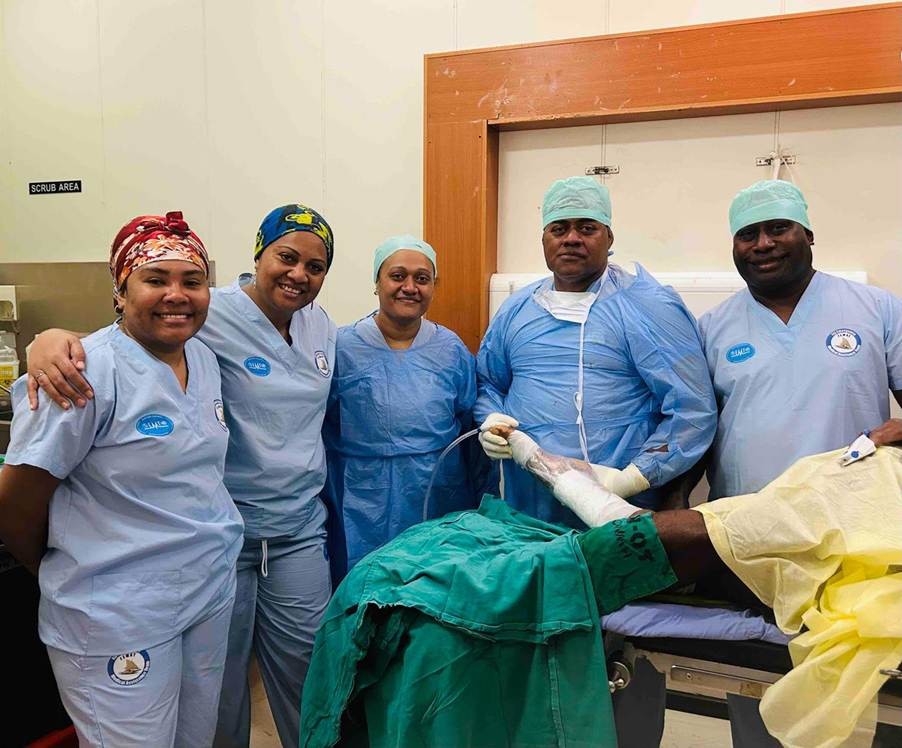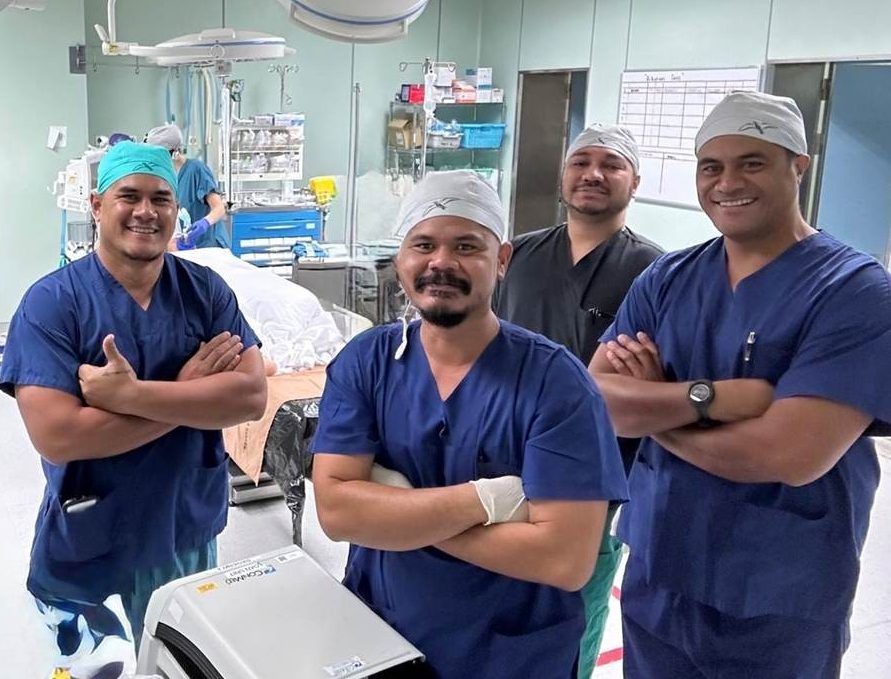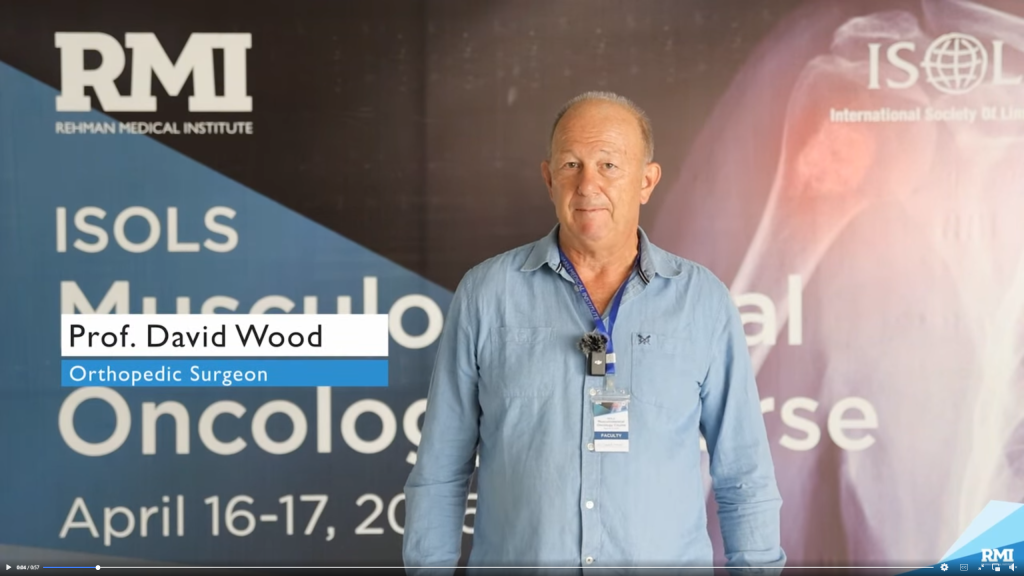When ISOLS Founder Frank Sim introduced sarcoma tumour surgery in the 1980s, he travelled to China to share his knowledge.
That same commitment to supporting emerging health systems and LMICs with training and resources has since driven major improvements across countries with limited health care systems in parts of Africa, the Middle East, and Asia. With the 2024 ISOLS Scientific Meeting held in Brisbane, attention turned naturally to the Pacific, where small, dispersed populations face unique challenges in accessing care. Brisbane marked the beginning of a new chapter for the region, built on shared expertise, regional collaboration, and a determination to close the care gap.
In 2003, Professor David Wood took part in an AusAID-sponsored medical trip to Papua New Guinea (PNG). Ten years later, those early links evolved into delivering musculoskeletal tumour courses in PNG, until AusAID support was withdrawn. Seeking to continue this work, he connected with Australian Doctors for Africa and began travelling to Ethiopia. There tumour case discussions began with Oxford colleagues Max Gibbon, Duncan Whitwell and Arthur Siddiqui, leading to the establishment of a formal course in 2015.
From 2015 to 2019, David and the team delivered these courses annually in Ethiopia, until civil war interrupted the program. In 2017, they engaged with the Ethiopian Ministry of Health to look at formalising tumour services. One Ethiopian surgeon was sent to Glasgow for a year-long fellowship, and today, he directs tumour services in Addis Ababa. Ethiopia remains the main focus in Africa, but the work has expanded to Zimbabwe, Somalia (launched just last month), Kenya, Tanzania, Zambia, Malawi, Iraq, and Pakistan in recent years.
Now, David and his colleagues are seeing the same transformation begin in countries that once could not provide sarcoma care at all.
Click on this video to watch the introduction to a course that over 100 surgeons registered for in Pakistan.
An ISOLS-funded course for LMICs originated in 2014 was inspired by a sobering statistic: of the world’s eight billion people, five billion have no access to musculoskeletal care. This program aims to help redress that imbalance through training and collaboration.
Following the great work of David Wood and his extended network of global colleagues, ten years since the course’s inception, the 2024 ISOLS Scientific Meeting in Brisbane became a catalyst for expanding the program into the Pacific. Through partnerships with organisations, the team was able to offer concessionary access to the course for surgeons from LMIC Pacific Island countries. Eighteen participants from across the region became beneficiaries.
As a region, the Pacific presents unique challenges: island nations with small populations scattered across a vast ocean. This makes it difficult to justify running a full tumour course in countries like Fiji, or Samoa. Instead, the approach was to bring participants together and support surgeons’ travel, ensuring they could attend both the dedicated Pacific orthopedic oncology course and the ISOLS Scientific Meeting.
Since the Brisbane Meeting, a monthly multidisciplinary tumour Zoom meeting has been established. Surgeons from Fiji, Samoa, Papua New Guinea, and Vanuatu present complex sarcoma cases, receiving input from ISOLS experts including Claudia Di Bella, Arthur Siddiqui, and Duncan Whitwell and more recently our president Peter Steadman. These discussions have already led to tangible improvements in sarcoma care for the island nations.
Orthopaedic Outreach and the Pacific Islands Orthopaedic Association, chaired by Dr Des Soares, has also provided strong support, both in facilitating delegates’ participation and in fostering professional networks. The benefits go beyond oncology; trauma case review meetings with Australian surgeons have also been introduced.
The ISOLS meeting and subsequent collaboration have produced more than just networking opportunities. Resource-stratified guidelines for tumour surgery in the Pacific have now been developed and published. As well as support systems, these guidelines also took a deep dive into highlighting significant resource gaps, such as pathology services in Papua New Guinea. Identifying gaps has led to constructive conversations about how to provide solutions.
Pauliasi Bauleka is a Fijian orthopaedic surgeon whose incredible work alongside another consultant at CWM Hospital in Suva serves a population of around 300,000 people – nearly half of Fiji’s population. He is based at the main referral centre and travels regularly to Lautoka and the northern islands every second week to reach patients across the country.
“In terms of workforce, we aren’t there yet,” he says.
“We need more training. Another colleague of ours is working towards his specialist registration to become an orthopedic surgeon. When he completes it we will have a welcome addition to our workforce, as the responsibility for this vast population is huge.”
Currently, they provide orthopedic cover for Labasa Hospital, the northern island referral hospital,which they visit 2-3 times a month.
When Bauleka was the recipient of a LMIC subsidy to attend the ISOLS Conference in Brisbane, it wasn’t just a turning point in his career, it was a turning point in Fijian Orthopedic Oncology.
“The LMIC program provided an entire day of interactive sessions with leading oncologists from around the world,” he says.
“I’ve been looking after the department alone for the last few years. To finally have guidance and collaboration was a huge stepping stone for the work I could do.” he reflects.
“In Fiji, most patients present with very complex cases at a late stage, when the disease is already terminal. Amputation was number one and nobody seemed to know about limb salvage procedures until I attended ISOLS last year – I was so amazed by the things I learned.”

FEMAT team – mobile hospital ( boat) – surgery during island outreach: Staff nurse Bulou; Dr Asela (anaesthetist); Staff Nurse Sisilia; Dr Bauleka (orthopedic surgeon); charge Pailato
Although Fiji has MRI capabilities, there are no PET or bone scans available. However, since returning from the conference, Bauleka has been able to make earlier diagnoses and introduce public health initiatives aimed at early presentation.
“The knowledge I obtained has allowed us to make earlier diagnoses. We’re now developing awareness programs so patients present earlier,” he explains.
These efforts include postgraduate training, and education on biopsy and early diagnosis, using social media as a launchpad to combat the issue of geography.
Bauleka is also driving a shift toward multidisciplinary involvement in patient care. “It’s not isolated to orthopaedics – better outcomes come with radiotherapy, chemotherapy, toxicology management, and multidisciplinary care,” he says. His department now runs weekly multidisciplinary team meetings every Wednesday morning and reviews diagnostic cases every second Saturday.
He also values the connections made with other Pacific Island colleagues through the conference. “We learn from other island colleagues – Bali, the Philippines – with similar health systems. These alliances and collaborations are a boost.” Looking ahead, he hopes for more fellowship opportunities, exposure to advanced training, and support for data collection and research that can improve outcomes for patients across the Pacific.
ISOLS would like to offer congratulations to Dr Bauleka who recently received an Honorary Diploma from Oxford University following his time in Brisbane.
Dr. Areta Samuelu is known in Samoa, not only for his work as one of the country’s leading orthopaedic surgeons but also for his role as a doctor with the Samoan Olympic team. His medical expertise has carried him from the sidelines of international sporting arenas to the frontline of one of the Pacific’s toughest health challenges: sarcoma and bone cancer. Balancing community service, national sporting commitments, and a heavy clinical workload, Samuelu has become a pivotal figure in shaping the future of cancer care in Samoa.
Samoa’s geography adds another layer of complexity. The country has only two major referral hospitals: TTM Hospital in the capital Apia, on Upolu Island, which caters to around 80 percent of the population, and MT2 Hospital on Savai’i Island, home to the other 20 percent.
“All surgeries and referrals are done in Upolu,” he explains.
“We run two clinics a week in Apia – Mondays and Fridays – and one community outreach clinic every two weeks at MT2 Hospital. The boat ride between the islands is an hour and fifteen minutes. There are eight rural health centres across both islands that feed patients into these hospitals.”
The demand for oncology services far outstrips local supply, but there are promising signs of change.

Surgery in Samoa: Areta Samuelu, Robert Fa’ataga (trainee), Michalelangelo Leota (trainee) behind and Shaun Mauiiliu (orthopaedic surgeon)
“At present, I have touched base with only two oncologists so far from Canberra, who have made a scope visit and are working on how to offer oncology services to the people of Samoa,” he says.
The hope is that these new collaborations, together with the Pacific-wide networks fostered through ISOLS and PIOA, will ensure patients in Samoa have access to the modern, multidisciplinary cancer care they deserve.
Attending the ISOLS-sponsored training in Brisbane proved to be a turning point in his practice.
“It has helped tremendously with providing a pathway to discuss our tumour cases not just from Samoa but also from the region,” he explains. “We have developed a multidisciplinary team for LMIC in the Pacific region through ISOLS and the Pacific Islands Orthopaedic Association that now meets every second Saturday of the month. This has helped with our decision making as we do not have oncologists, tumour surgeons or even musculoskeletal radiologists who can guide us in a proper MDT approach. ISOLS has provided that invaluable platform and I am grateful for it.”
Working in a setting with limited resources means constantly finding ways to overcome barriers to care.
“We discuss all tumour cases with colleagues in New Zealand and across the Pacific through our network,” he says.
“The ISOLS MDT LMIC sessions have helped us identify our limitations – in tumour surgery, radiology and oncology – and refer our cases for neoadjuvant and adjuvant chemotherapy. At this stage we are not able to offer limb-sparing surgeries; amputation is what we can provide. Fortunately, we do have a good service for prostheses, especially with limb sarcomas.”
“Our orthopaedic department has two orthopaedic surgeons – myself and my colleague – plus two trainee registrars. All of us attend along with PIOA students from across the region. These sessions help us address our limitations and learn the proper way of handling tumour cases. They ensure we are on the same page and upholding the standards of tumour management. We now also include our pathology and radiology departments in these meetings, which benefits them too.”
Despite these challenges, systems have been built to ensure even remote cases receive proper assessment. “Our orthopaedic department is notified by the public system, through outpatients, emergency and rural health centres, and by private GP referral. Each tumour case undergoes a proper history, examination, and investigations before being discussed at our MDT LMIC meeting,” he explains.
“This is the start of ensuring oncology can be offered in our country efficiently.”
In May 2024, the ISOLS-accredited Introduction to Musculoskeletal Tumour Surgery course was published on the Global Surgery Hub. It includes 10 open-access lectures and 100 multiple-choice questions. So far, over 250 surgeons have logged into the course, with feedback from the Global Surgery Coordinator noting that participants enjoyed it and wanted more advanced, in-depth material.
David Wood’s team is now developing further online resources, possibly leading to an accredited master’s degree in orthopaedic oncology, to help surgeons in LMICs build academic as well as clinical expertise.
There are also plans to translate the open-access introductory course into French and Spanish to reach even more LMIC surgeons, particularly in Africa and South America.
From Harare to Lahore, from Addis Ababa to the scattered islands of the Pacific, the reach of this work continues to expand. Through in-person training, virtual collaboration, and online courses, surgeons in some of the most resource-limited settings are building the expertise, networks, and systems they need to deliver life-saving musculoskeletal tumour care.
The Pacific Island MDT sessions hosted with ISOLS have become a cornerstone of care, with meetings every second Saturday of the month. ISOLS members from the UK, USA and Australia join to facilitate discussions and guide pathways in oncology patient management and momentum is growing.
What began with a single trip to Papua New Guinea in 2003 has now become a global movement, one that is steadily closing the gap in access to orthopaedic oncology, one country, and one committed surgeon, at a time.
The ISOLS 2026 Scientific Meeting Vienna has extended an open invitation for LMIC participants to attend its next meeting, with travel support offered to a limited number of eligible members.

